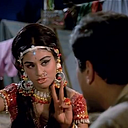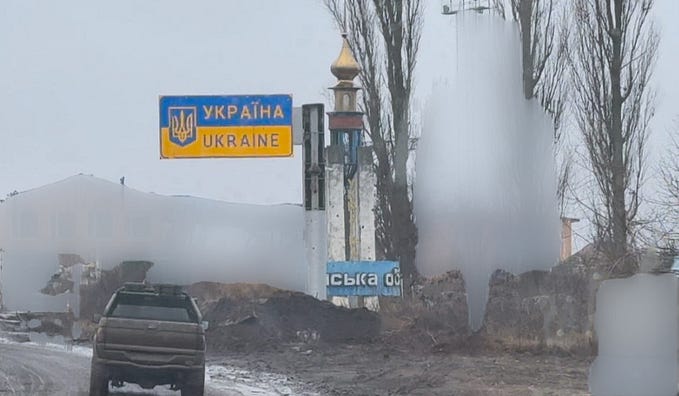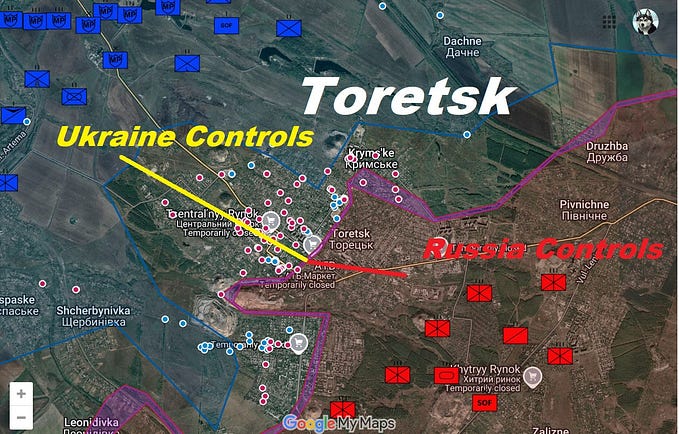After Tulsi Gabbard renounced her relationship with the Democratic Party yesterday on the Joe Rogan show — and on the first episode of her new podcast, I kept seeing a lot of people wondering about Tulsi Gabbard’s relationship with the World Economic Forum. That is because back in 2015 the WEF put a picture of Tulsi on their website while claiming she was one of their Young Global Leaders. Here is everything you need to know about the WEF, their Young Global Leaders, and what Tulsi Gabbard has to do with them.
Tulsi was informed that she had been chosen as a Young Global Leader (YGL) in 2015. Not really knowing much about them she then sent a tweet thanking them.
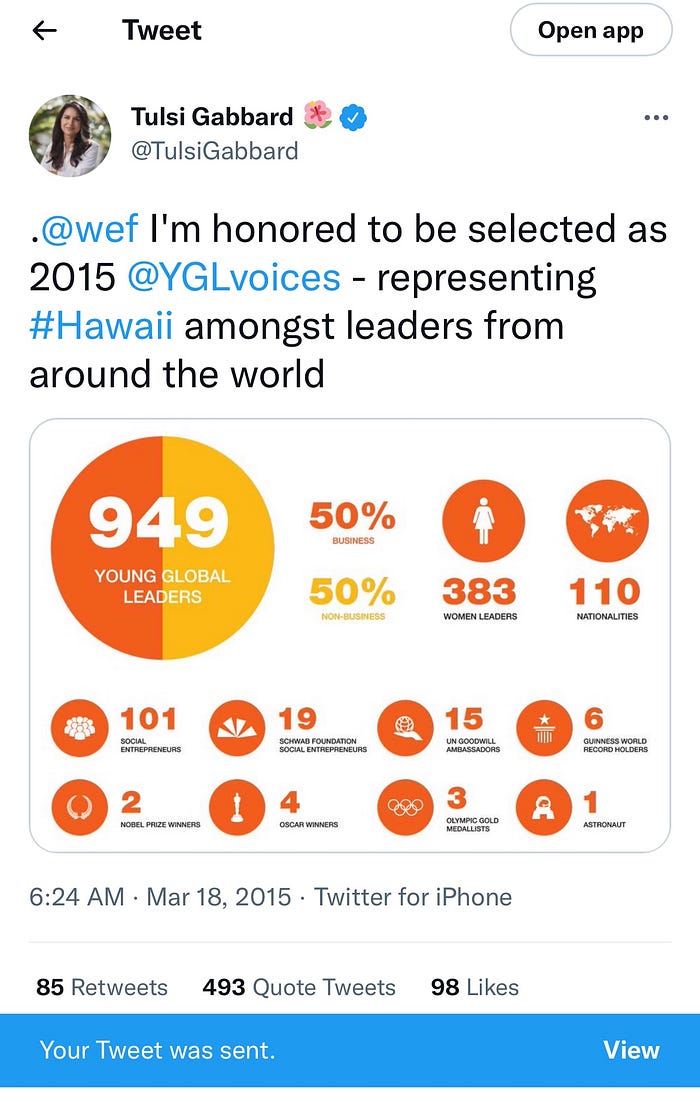
That is commonly how people become a World Economic Forum YGL. They select people whom they believe can add some benefit to their organization and then email them telling them they have been selected. We know the process of what happens because a young popular politician like Tulsi Gabbard but from Canada, went through the process and then wrote about it. This is from MP Michelle Rempel Garner:
In January 2016 I woke up to an email with the subject, “You Have Been Selected as a Young Global Leader (YGL)”. I thought it was likely spam, but upon opening it I realized it was no joke. The YGL program is a big part of the broader WEF programming. Businessweek magazine described it as: “the most exclusive private social network in the world.” This is an overstatement; but members do include the likes of Sergei Brin, Ivanka Trump, Mark Zuckerberg, Amal Clooney and many of the top up-and-coming political leaders in the G20.
That is typically what happens. It happened to Tulsi Gabbard and also to Congressman Dan Crenshaw who explained how out of the blue he had been chosen with no contact before or since. MP Michelle Garner continues:
At my own expense, I went to a meeting of the community in spring of 2017 to check out what being a YGL was all about. The meeting was no different in feel from an academic conference, if a bit more global in nature and with more high-profile politicians and CEOs in attendance.
In January 2018, like many other conservative Canadian politicians have in the past, I attended the annual WEF meeting in Davos. To make it affordable for myself, I rented a tiny Airbnb about a 30 kilometre drive outside the conference site. I packed a lunch. I trudged through the snow in a parka and boots while the motorcades of world leaders drove by. I watched Justin Trudeau give a speech to an empty theatre with members of the Canadian Parliamentary Press Gallery who had travelled to cover the event.
At both these conferences, and in a subsequent session I attended in New York, I attended sessions and respectfully debated with others. Everyone I interacted with was professional and thought-provoking. When I interjected with my right-of-centre leanings, no one ejected me into the streets.
The WEF is certainly elitist, but, to my eyes, it fell far short of being a cabal bent on global domination.
So why all the conspiracy theories?
First, the content, timing, and title of the Great Reset document was blissfully naïve and arrogant at best, and flat-out crackers worst. Video also emerged of Klaus Schwab implying that the WEF had influence over attendees who had secured roles in the cabinets of several countries, including Canada. When I saw it, I was shocked at the presumption of the claim that he had influence over Canadian lawmakers by simple virtue of giving them an award. I guess this was done to increase the WEF’s prestige, or to convince companies to fund the organization — in other words, it was marketing — but it showed incredibly poor judgement and eroded his credibility.
And I have been harassed ever since.
Where conspiracy theorists are correct to note that the WEF is elite and opaque; that is its nature. It literally bills itself as an elite club. Rather, they are wrong to assume that a legislator in Canada could be influenced in all matters simply by attending a conference, receiving an award, or reading a badly conceived white paper. In Canada’s democracy, we are accountable to the needs of our constituents.
Why does the WEF choose people to become Young Global Leaders? Well, you first need to understand — the WEF is a business. If you want to go to the WEF meetings and hobnob with the so-called elites you will need to pay the WEF a whole lotta love. Kidding, you need to pay them a frakload of ducats.
From Wikipedia:
The foundation is funded by its 1,000 member companies, typically global enterprises with more than five billion dollars in turnover (varying by industry and region). These enterprises rank among the top companies within their industry and/or country and play a leading role in shaping the future of their industry and/or region. Membership is stratified by the level of engagement with forum activities, with the level of membership fees increasing as participation in meetings, projects, and initiatives rises. In 2011, an annual membership cost $52,000 for an individual member, $263,000 for “Industry Partner” and $527,000 for “Strategic Partner”. An admission fee costs $19,000 per person. In 2014, WEF raised annual fees by 20 percent, bringing the cost for “Strategic Partner” from CHF 500,000 ($523,000) to CHF 600,000 ($628,000).
Prices have gone up since than.
From NYPost 2022
Getting into Davos is impossibly complicated, even for those lucky enough to score invites. First, you must gain membership, limited to just 1,000 of the world’s biggest corporations, which starts at $62,000 per year and can run up to $620,000 for “strategic partners.” (Government employees, non-profits, and media outlets get in for free.) The ski resort town has only so many hotel rooms, with even bare-bones chalets going for more than $400 a night, so some attendees must commute in from neighboring villages, where accommodation is limited and going for absurdly inflated prices.
The WEF meetings are a hugely profitable business that creates a place for business people with enough clout and money to mingle with government officials, people from non-profits (usually from the very rich upper class who run non-profits as hobbies), media figures, celebrities, and politicians. What actually goes on there is split into two basic parts.
- Official presentations in auditoriums or rooms where people give talks and presentations to an audience.
- Schmoozing in and around the WEF premises and Davos. This is the main thing. People own or rent expensive homes or chalets in and around Davos and invite people to parties, dinners, outings, etc.
It is a hyper-glorified business conference similar to what you see all over the world when various organizations rent out conference centers in resort areas (Las Vegas is very popular in America) and invite business people, celebrities, politicians, media, etc. Usually they pay for famous people to come and perform by giving a talk or entertain if they are a musician or comic. The difference with the WEF at Davos is the amount of money it costs and the exclusivity — which is the whole appeal. Their business model is to make it very exclusive and expensive so rich people will pay a lot to mingle with other rich or famous business people, politicians, celebrities, etc.
That is all it is. It is not like the Bilderberg conferences or the Trilateral Commission or The Council on Foreign Relations meetings. Those are very exclusive and limited to a very select group — you can’t join just because you own a big business or are rich or famous. They are for discussing policy by VIPs, not for what are essentially TED Talks for the rich and famous like at the WEF. The WEF at Davos is more like a vacation. It is at a famous resort town in Switzerland with the attraction of going to lots of parties with rich or influential people and celebrities — and a bunch of “talks” and presentations.
The Young Global Leader thing is a way to attract more rich people. They select people who are recently in the news and who have become relatively recently well-known who they think will attract more rich people or celebrities to Davos. For example: In 2012 before Tulsi Gabbard had been elected to Congress the Democratic Party was promoting her as their new shiny object. She was being promoted as the new leader for a new generation of Democratic leadership by the party elders. The media wrote glowing articles and she was praised on mainstream news shows. The DNC made her a vice-chair right off the bat even though she was a new member of Congress. She was being promoted somewhat like AOC was promoted by the media, except much more so since they didn’t really know what Tulsi was all about. All she was to them at that time was a young attractive female military veteran, an officer in the Army reserves, a woman of color, who could surf really well, and speak thoughtfully — which they saw as electoral gold, as a way to attract young voters to the polls. The WEF selection committee for Young Global Leaders chose Tulsi for the same reason they chose MP Michelle Rempel Garner. Michelle explains:
I didn’t give the award much thought. I was 36 at the time and had had other similar honours bestowed upon me. Prior to running for office, at age 29, I was named one of Canada’s Top 100 Most Powerful Women by the Woman’s Executive Network. I was 33 when I was appointed to federal cabinet. I’ve made my way on the Maclean’s Power List, won Parliamentarian of the Year awards, and other “most influential people” lists. These are all honours, to be clear. But none triggered the response that being a YGL did.
The many critical theories I have seen centered around Klaus Schwab and the WEF lack a clear understanding of what the WEF meetings in Davos are for and how it differs from the Think Tank aspect of the WEF. The WEF Think Tank puts out reports and publishes books like The Great Reset. The Davos meetings are not the same thing as the WEF Think Tank. The meetings at Davos are for the rich and powerful to mingle with other famous or influential people while making a lot of money for the WEF. It is mostly known for the party scene and less so for the public talks and presentations.
The Think Tank aspect is similar to other Think Tanks. They have employees write research papers and also publish books. Depending on the Think Tank the employees are told to research and write on specific topics that are wanted by the people who fund the Think Tanks. They are intellectual guns for hire.
Tulsi Gabbard was sent an email in 2015 saying she had been chosen as a Young Global Leader and she sent them a tweet saying she was honored. She never had anything to do with them before or since. But they also posted a picture of her on their website as advertising for their yearly shindig at Davos. The same thing happened to Dan Crenshaw. He never had anything to do with them but they posted a picture of him on their website because at the time he was a hot news topic. So it appears that the purpose of the YGL is to draw more rich people to their shindig by advertising that the rich can meet famous young people in the news. Some chosen as YGL go to Davos and mingle and give talks, others don’t.
After being bugged online over her picture being on the WEF website as a Young Global Leader, after telling people over and over on Twitter and Instagram that she had never gone to Davos and had nothing to do with the WEF, Tulsi asked the WEF to remove the picture of her from their promotional materials which she never consented to in the first place. And as the WEF became more well-known Tulsi had something to say about them:
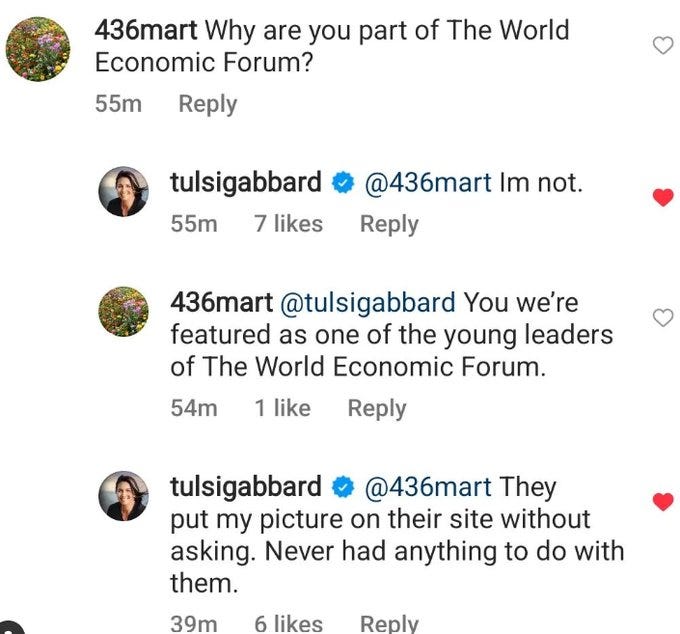


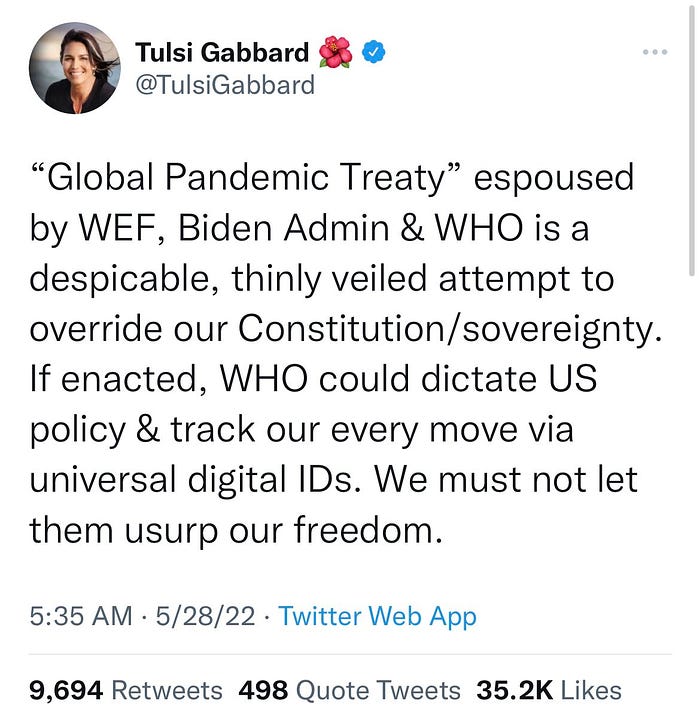
Here is some more from MP Michelle Rempel Garner:
After spending the day knocking on doors during the recent election campaign, my husband and I decided to grab a late-evening meal at a local pub. We invited some friends — it was supposed to be a rare normal night amid the craziness of a campaign.
It was evening, the bar was crowded, we had just finished our meals and my husband, Jeff, spotted the trouble before I did. A thickly built man seated at the bar was paying too much attention to me. He crossed the floor of the restaurant, camera in hand. His actions and his posture clearly said that he was bent on physically harming me, causing an altercation, or both.
As he charged forward, he started yelling at us about the World Economic Forum, demanding that I answer questions about my “ties to Klaus Schwab.”
It wasn’t until much later, at home after the situation had been diffused and the shock was just starting to wear off, Jeff asked me, “Do you think people actually buy into that stuff?”
For me the question has never been whether or not people buy into conspiracy theories about the World Economic Forum.
They do.
The WEF probably could be better described as a left-of-centre think tank and lobbying facilitator that hosts annual meetings in the tony Swiss ski resort of Davos. There, lobbyists, politicians, the media, and some parts of academia from all over the world mingle in eye-wateringly expensive hotels placed between narrow snow-covered streets.
Companies who pay sizeable fees to the WEF meetings seemingly get access to members from other industries, key thought leaders, and policy influencers from around the world. In return the WEF gets the prestige of hosting these types of meetings. For thought leaders and influencers, WEF meetings and access to its broader community can serve as a way to diversify one’s knowledge in many different fields. Think LinkedIn for the c-suite but in person.
In the last two years, a volume of conspiracy theories regarding the WEF and Klaus Schwab began to circulate on social media. They arose after the think-tank arm of the WEF published what could generously be described as an overwrought leftist article called the “Great Reset.” The document was light on details and heavy on change-the-world rhetoric.
The paper suggested that global pandemic recovery efforts could be used to alter many global institutions in a way that leftists would favour. It was released in June 2020, at a time when much of the world was sitting in fresh pandemic lockdown measures.
The Great Reset was published by a global organization best known for the secrecy of its elite members during a time when fear about COVID and its response dominated global media. In other words, it was a Molotov cocktail launched into a rapidly brewing gas bed for conspiracy theories regarding the origins of COVID.
The conspiracy theories related to the Great Reset went nuclear when a video of a meeting Justin Trudeau had at the United Nations in late 2020 surfaced. In the video, Trudeau was quoted as suggesting the pandemic could provide for a “reset.”
This was the proof point that made the theories believable for many.
My encounter at the restaurant in fall 2021 wasn’t the first time I had men aggressively confront me in public about the WEF, and these incidents have taken their toll. Two weeks earlier a group of men had spotted me door knocking on the street in Calgary. They spun their car around, jumped out of it and aggressively came at me demanding that I “answer questions about Klaus.” Before that, the threats and accusations had been coming into my office’s inbox for over a year. If you like to see a sample for yourself, check my mentions on Twitter.
It’s terrible. But it’s no mystery why it’s happening.
There should be no doubt that the WEF Think Tank is influential among elites for the same reason the WEF meetings at Davos are influential. It is the same reason that movie or music award shows are popular for people in the movie or music business — it is not only for self-promotion, it is also a schmooze fest at the parties before and after the award show. Actors or musicians can mingle with the rich people who can fund their movies or albums at those parties. The WEF meetings, not the Think Tank, are more or less the same thing if you are rich enough, famous enough, or influential enough. The idea that the WEF is a gathering of the rich and influential some of whom seek dominance over the world of business or politics, may be true to one degree or another, but there are many similar gatherings, it is not the only one. The Aspen Institute meetings, Milken Institute meetings, etc. Then there are the older exclusive American retreats like The Bohemian Grove or The Rancheros Vistaderos, or The Roundup Riders, and many exclusive clubs for the rich and powerful like The Links, The Brook, etc.
Young Global Leaders are not “put in power” like many believe. You cannot become a YGL unless you are already in a powerful position. It goes like this: 1) You are fairly young and become famous for some reason, usually as a political figure 2) The WEF tells you that you have been selected and wants you to come to their shindigs and be part of their dealio. It is not the other way around. They don’t put people into power, people in power join them — and then the WEF brags how people in power are associated with them. It is all about expanding the reach and riches of the WEF by attracting rich people to join — by dangling the opportunity to mingle with newly famous and influential people. Simple as.
